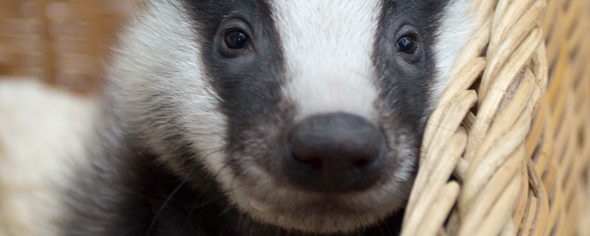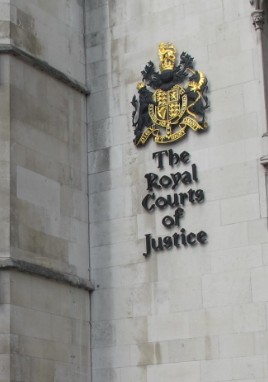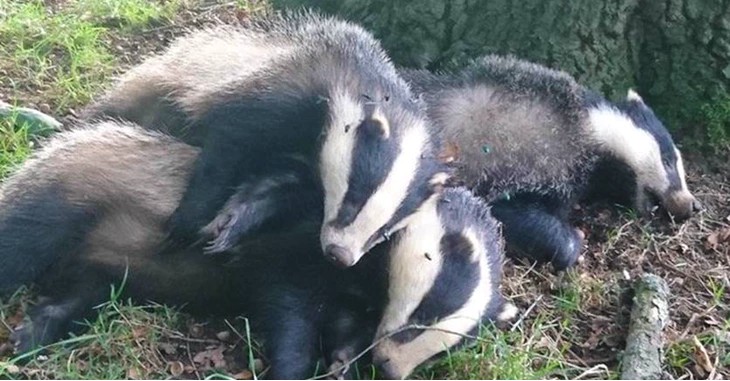
A detailed account of the legal aspects of what happened last Tuesday 26th is currently being prepared with the help of legal advisors. This is an initial summary of what happened, what it means and where we go from here. The investment of many people in this legal case has been considerable, with a large number of organisations and individuals giving time and resources generously over the last two years. Learning from the outcomes when you don’t win is important and can be valuable, and we will make sure we use the experience to best advantage.
As you may know, the previous cases concerning ecological impacts on designated sites in the High Risk Area in 2017 and 2018 managed to move Natural England to create a system whereby they assessed each designated site for possible outcomes caused by removing badgers and changing the wild community dynamics of species and habitats of international importance. In many cases NE started to impose conditions intended to protect the most strictly biodiversity interests where there had previously been none. Despite this, and as with other large-scale actions such as the release of huge numbers of game birds for people to shoot, there is a view within Natural England that the impacts of badger culling are low, even if factual evidence for that position is lacking and chronically under-researched. No matter how uncertain the data is in relation to negative effects, the commercial interest in the damaging activity takes precedent. And while the judge in the previous cases chided Natural England for being in breach of their statutory duty, the resulting actions in response have been largely a tick box exercise involving game keeping in shooting areas near nature reserves and a flimsy exercise using volunteer bird watching data held by the British Trust for Ornithology that leaves a lot to be desired (see here). There has been no actual monitoring of change over time in the designated sites, no detailed research (it would cost a lot and is too late now, says government). Basically, Natural England have maintained their position on the back of no proper evidence, that effects are small, and their view is that precautions are barely necessary. They just ride along happily with inadequate resources to do their job thoroughly, and obediently back up their master Defra when questions are asked. The legal challenges have forced them to improve assessments and protective provisions somewhat, but only in relation to protected sites. The latest challenge that began in 2020 and ended in the Court of Appeal on Tuesday, sought to expose and address the illogicality of Defra and NE’s position that there was an agreed need for assessments and protective provisions in and around designated sites, but no such provision in the wider countryside, even dealing with precisely the same species.
So, what went wrong on Tuesday? Well, it started last year when we had the main Judicial Review hearing in July 2021, having waited for over a year to get into court following the 2020 ‘Next Steps’ policy. In August, Mr. Justice Griffiths decided that it was okay for the Secretary of State not to have regard for protection of NERC Act (2006) species and habitats when making the policy. We thought this was plainly wrong and so did many others. Natural England and Defra evidently also thought Mr Justice Griffiths’ decision was vulnerable to being overturned on appeal, and decided on a clandestine plan to cover their backs with some ‘after-the-event’ actions. So, whilst the appeal claim was being lodged in August 2021, Defra and Natural England were quietly cobbling together a briefing for the Secretary of State (comprised of not very much) to rectify his failure to ‘have regard’ to biodiversity when making the decision to adopt ‘Next Steps’.
This briefing to the Secretary of State on the biodiversity implications of the badger cull (pursuant to the NERC Act 2006 duty) was kept secret, possibly because it was a clear admission that the Government itself also believed that Mr Justice Griffiths had erred when ruling that the biodiversity duty didn’t apply to the impugned Next Steps decision. Not withstanding the recommendations in 2018 (Godfray Review) that further research of biodiversity effects was needed, the duty was thus discharged after the event and in the most cursory manner. Without anyone knowing, without anyone being consulted and without anyone being give the chance to say, hang on, your do-nothing approach is flawed.
Secretary of State George Eustice signed this off behind everyone’s back in December 2021 and the Government then sat on it. They didn’t tell the claimant or the Court of Appeal what they had done. Why not? Because Defra have always liked to play for time and keeping people in the dark is a way of minimising the public interest right to monitor potential government bad practice. In April of this year, the Court of Appeal granted permission for the Appeal case to be heard. Defra then played the card that they had kept up their sleeve. They announced to the court what they had done via a witness statement from Vet Eleanor Brown, deputy head of bovine TB policy at Defra, resting on the Natural England re-hash of the little that is known about ecological impacts of mass-killing healthy badgers. By remaking the decision, Eustice was in effect saying that even if judge Griffiths did get it wrong, I have considered it now and so I can go ahead and cull this year – you can’t stop me. Your appeal is now of academic interest only because the Appeal judges cannot quash the 2020 policy in front of the 2022 cull season. Defra wrote to the courts wanting the Appeal dismissed before the hearing date that had already been expedited to the end of July.
Of course, this pulled much of the rug from under the legal challenge, and more legal advice was needed. The advice was that there was a chance that the Court of Appeal would still appreciate the trickery that had gone on, and want to correct the legal mistake of Mr. Justice Griffiths and hear the appeal accordingly. The Court of Appeal admitted the new Defra evidence describing what Defra had done behind everyone’s back on 4th July, set the hearing for 26th July and appointed the three judges.
At the start of the Appeal hearing, the legitimacy of the request to obtain what is called ‘declaratory relief’ (recognition of the incorrect judgement) would become the first part of the session – simplified to the legal arguments as to whether the case was ‘academic’ or not, i.e. the Griffiths judgement being determined as wrong, even if the defendant (Defra) isn’t obliged to do anything other than lose and pay costs to the claimant. The judges decided after 90 minutes that they would shut down the case straight away and not hear it. They seemed initially a bit conflicted. We might ask what the point was in holding an Appeal only to shut it down before it happened? This was because the judges decided to take the position on there being no need for the Minister to give relief (remake the policy) because of what he had done behind backs and because of a provision in something called the Senior Courts Act – specifically Section 31(2A). This clause can be used by a defendant (and has been by Defra in the past) to get around legal sanction by claiming that even if an action (decision, policy etc) was done in the wrong way, ‘had I done it in the right way I would still have made the same decision’. This is a sort of ‘get out of jail free’ card, but this is no game. It is governments way of getting away with malpractice and is another part of the story as to how badger culling will continue as government out-manoeuvres public good by throwing time and money (at public expense) at ways to avoid doing things openly and correctly. They might think they have been clever. But they haven’t, they have been somewhere between devious and deceitful, and it does not make for open government or fairness. It is a will to win, only to win and to back up the government policy at all costs. It is a will not to address legitimate concerns about the erosion of the countryside.
As for the badgers and our wildlife in rural areas – they will continue to be subject to the subtle, unmonitored and unresearched stochastic forces that apply to our fragmented landscapes. They will be buffeted by the unpredictable activities of many land managers whose view of British wildlife is that they are pests to commercial land use, to be constantly depleted to low numbers, even if this displaces and disperses them to greater distance and into unfamiliar areas where they seek to feed and compete with resident animals.
We therefore did not get justice, we were strung out by a combination of a government keen to ‘win dirty’ and a Court of Appeal apparently disinterested in a bad legal decision, the biodiversity crisis and the strength of legislation in the 2006 or 2021 Acts, where duties to biodiversity are enshrined. How easy will it be now where there is uncertainty, a lack of research and need for precautions for someone to say, ‘well, these duties don’t really add up to much, do they?’ So it was a bad day for badgers, a bad day for wildlife and a bad day for public interest.
We must try not to be too downhearted and take the fight back to government in every way possible to stop the failed, pointless, damaging , unscientific, cruel and wasteful badger culls. Huge thanks are extended to our legal team, Richard Turney and Ben Fullbrook of Landmark Chambers and Lisa Foster and Hannah Norman of Richard Buxton solicitors, expert witness Dominic Woodfield and to all those funding and supporting the legal work as a part of the Badger Crowd. This includes The Badger Trust who helped instigate the legal action against aspects of the ‘Next Steps’ policy in 2020, Badger Trust Sussex for administrative assistance and for managing offline donations, Wild Justice, very many of the badger groups and organisations around the UK, many other animal welfare and conservation bodies and several generous individuals. Hundreds of badger workers and the public have also chipped in to spread the load. Others have helped with a wide range of supporting actions: research, advice, publicity, and coordination. Thanks to all turning up in London over the last two weeks to show support for the badger culls to be ended.
What has happened is bad governance at the highest level, but we are used to that these days. We will take the learning and redouble our efforts.
Thank you for your part in this. Further information will follow over the next few days and weeks.



